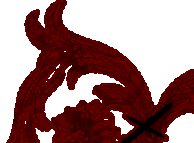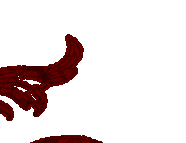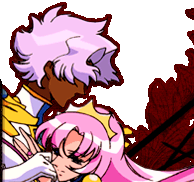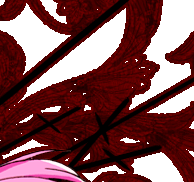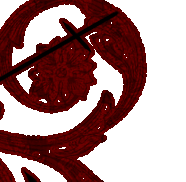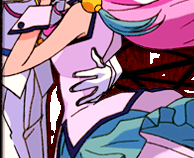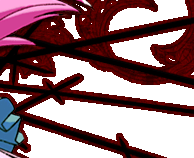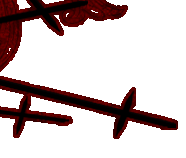
This analysis
was donated by Ryan Haecker.  Introduction to the Setting of the Ohtori Academy
Revolutionary Girl Utena" is a shōjo, or 'magical girl', animated series which presents the adventures of a tomboyish girl, Utena Tenjou and her ambition to become a prince. 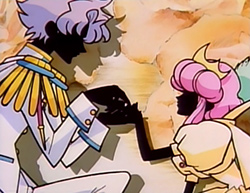 The series is set at the prestigious Ohtori Academy for teenage students. The Ohtori Academy is apparently ruled by a Student Council of tremendous authority and self-importance, whose five select members wear a rose-seal ring and are uniquely permitted to enter the forbidden forest dueling arena. The Student Council is directed by a succession of letters mailed from the mysterious "End of the World", whose millenarian instructions are said will soon bring about the about the "World Revolution". The Academy is richly decorated in French fantasy-gothic architecture, stained-glass windows, and accompanied by grandiose organ music. French ornament, letters and Empire-style costumes are continually employed throughout the series, lending the Academy a classical north-European motif (at one point in the series, a teacher mentions there is a sister-school in the Netherlands). The geographic dislocation of this foreign occidental design hints at the spacio-temporal dislocation of the setting. Through a baffling variety of surreal psychosexual imagery and supernatural occurrences "Revolutionary Girl Utena" continuously destabilizes a coherent or literal interpretation of the characters and themes. For this reason, "Revolutionary Girl Utena" has been described as an example of a post-modernist fairy-tale. The series is set at the prestigious Ohtori Academy for teenage students. The Ohtori Academy is apparently ruled by a Student Council of tremendous authority and self-importance, whose five select members wear a rose-seal ring and are uniquely permitted to enter the forbidden forest dueling arena. The Student Council is directed by a succession of letters mailed from the mysterious "End of the World", whose millenarian instructions are said will soon bring about the about the "World Revolution". The Academy is richly decorated in French fantasy-gothic architecture, stained-glass windows, and accompanied by grandiose organ music. French ornament, letters and Empire-style costumes are continually employed throughout the series, lending the Academy a classical north-European motif (at one point in the series, a teacher mentions there is a sister-school in the Netherlands). The geographic dislocation of this foreign occidental design hints at the spacio-temporal dislocation of the setting. Through a baffling variety of surreal psychosexual imagery and supernatural occurrences "Revolutionary Girl Utena" continuously destabilizes a coherent or literal interpretation of the characters and themes. For this reason, "Revolutionary Girl Utena" has been described as an example of a post-modernist fairy-tale.
Due to these complexities any explanation of the plot will require an allegorical interpretation of the series which examines the metaphysical significance of the imagery and storytelling. However because of the uncertainty of the show's internal cosmology and metaphysics, interpretations of "Revolutionary Girl Utena" often vary tremendously. Therefore to give a definite basis for an allegorical interpretation of the imagery, setting, plot, characters and themes of "Revolutionary Girl Utena", this essay will illustrate the cosmology and metaphysics through the philosophy of idealism. Idealism maintains that what is real is known to the mind principally through ideas regardless of the persistence of mind-independent entities. Mind-independent phenomena are unknown to the mind and thereby unreal. Idealism therefore collapses the subjective-objective distinction of empirical realism which supposes there to persist a real world existing beyond the mind's knowledge and experience. For idealism, all reality, objectivity and actuality are reduced to ideas which are simultaneously created and beheld by and for the self-conscious mind, or the transcendental ego.
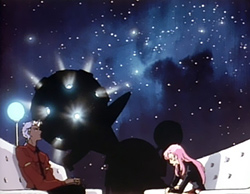 In the first episode, the show's pink-haired protagonist Utena Tenjou ascends the winding staircase of the schools’ forbidden dueling arena and is shocked to discover an immense inverted and rotating castle in the sky above. This castle is the object of all of the character's aspirations. It is the place where the Prince lives, which holds eternity, and grants the power to bring miracles and happiness forever and ever. Yet Utena’s dueling opponent, Saionji, tells Utena that this is merely "a trick of the lights". This brief comment warns the audience that much of what Utena, and by extension the audience, witnesses through Utena's perspective is an unreal illusion whose extent is never definitively disclosed. The surrealism of the show derives from this feature: truth and illusion, fantasy and reality continuously interweave and interpenetrate throughout the setting. The chairman of the Ohtori Academy, Akio Ohtori, lives in an immense Gothic tower which dominates the skyline of the Academy and the sea-side town below. The chariman's room houses an enormous astronomical observatory and is furnished with only few items, with the prominent exception of a large planetarium projector. In the final episode, the chairman reveals that, unbeknownst to the students, he been using his planetarium to create illusions of many fantastic settings and events throughout the series. He exclaimed "I shall now reveal reality to you... The end of the World"! It may be therefore be interpreted that much of what occurs in "Revolutionary Girl Utena" had been fabricated and coordinated by Akio, who had worked behind the scenes as the puppet master of an unreal and illusory cosmos.
In the first episode, the show's pink-haired protagonist Utena Tenjou ascends the winding staircase of the schools’ forbidden dueling arena and is shocked to discover an immense inverted and rotating castle in the sky above. This castle is the object of all of the character's aspirations. It is the place where the Prince lives, which holds eternity, and grants the power to bring miracles and happiness forever and ever. Yet Utena’s dueling opponent, Saionji, tells Utena that this is merely "a trick of the lights". This brief comment warns the audience that much of what Utena, and by extension the audience, witnesses through Utena's perspective is an unreal illusion whose extent is never definitively disclosed. The surrealism of the show derives from this feature: truth and illusion, fantasy and reality continuously interweave and interpenetrate throughout the setting. The chairman of the Ohtori Academy, Akio Ohtori, lives in an immense Gothic tower which dominates the skyline of the Academy and the sea-side town below. The chariman's room houses an enormous astronomical observatory and is furnished with only few items, with the prominent exception of a large planetarium projector. In the final episode, the chairman reveals that, unbeknownst to the students, he been using his planetarium to create illusions of many fantastic settings and events throughout the series. He exclaimed "I shall now reveal reality to you... The end of the World"! It may be therefore be interpreted that much of what occurs in "Revolutionary Girl Utena" had been fabricated and coordinated by Akio, who had worked behind the scenes as the puppet master of an unreal and illusory cosmos.
In Plato's famed "Allegory of the Cave",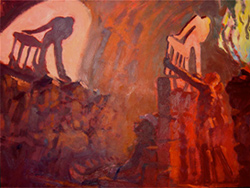 Socrates describes to his friends how much of what people commonly experience in the ‘real’ world is merely an illusion similar to shadow-puppetry. Socrates describes how the philosopher who comes to know the eternal Forms of Goodness and Beauty thereby ascends from their naïve appreciation of shadows in the darkness of a cave to the sunlit world above. This ascent from the cave of illusions to the sunlit world of the ‘real’ world is an allegory of esoteric philosophic initiation from false to real knowledge, and from youthful ignorance to aged wisdom. In "Revolutionary Girl Utena" the casts' drama of the self-discovery is mirrored in Utena's growing awareness of the unreality of the Ohtori academy and the source of illusions emanating from the chairman's tower. The characters of "Revolutionary Girl Utena" are continually immersed in the idyllic childhood illusions of the Ohtori Academy, whose imagery had been constructed for them by the chairman Akio. From the heights of his tower he had, like Jeremy Bentham's Panopticon, observed and presumably manipulated everything which had occurred in the Academy. The presumed omnipresence of the chairman introduces an interpretive difficulty as the audience, like Utena, remains perpetually uncertain as to how to distinguish between real and illusory events. Socrates describes to his friends how much of what people commonly experience in the ‘real’ world is merely an illusion similar to shadow-puppetry. Socrates describes how the philosopher who comes to know the eternal Forms of Goodness and Beauty thereby ascends from their naïve appreciation of shadows in the darkness of a cave to the sunlit world above. This ascent from the cave of illusions to the sunlit world of the ‘real’ world is an allegory of esoteric philosophic initiation from false to real knowledge, and from youthful ignorance to aged wisdom. In "Revolutionary Girl Utena" the casts' drama of the self-discovery is mirrored in Utena's growing awareness of the unreality of the Ohtori academy and the source of illusions emanating from the chairman's tower. The characters of "Revolutionary Girl Utena" are continually immersed in the idyllic childhood illusions of the Ohtori Academy, whose imagery had been constructed for them by the chairman Akio. From the heights of his tower he had, like Jeremy Bentham's Panopticon, observed and presumably manipulated everything which had occurred in the Academy. The presumed omnipresence of the chairman introduces an interpretive difficulty as the audience, like Utena, remains perpetually uncertain as to how to distinguish between real and illusory events.
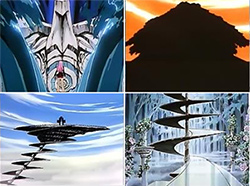 The Ohtori Academy appears as a fashionable and pleasant setting for adolescent social life with a pristine hill-top college decorated in French fantasy-gothic ornament. A wide variety of students are represented who are uniformed strictly according to their sex in bright colors: boys wear green suits with black ties while girls wear short green skirts with white blouses and red bows. Apart from the dorms, classrooms and gymnasiums, the Academy is dominated by two gigantic structures with clear psychosexual symbolism which announce the principle themes of the series: the immense tower of Akio's planetarium observatory and the gargantuan forest-mound which houses the forbidden dueling arena. The function of these structures, one as creative and the other as romantically climactic, neatly corresponds to their respective psycho-sexual imagery. The forbidden dueling arena is the sight of each episode's epee sword duel whose victor is rewarded with the possession of "the Rose Bride". These duels are decided when one duelist cuts the rose affixed to their opponent's breast. The steel swords are a recurring phallic symbol in the show, while the roses are recurring uterine symbols. Prior to the duels the opponents’ swords are magically pulled from the breast of the duelists thereby becoming a steely manifestation of their heartfelt agony and desire. The duels of these swords therefore represent the trials of courtship, the agonies self-disclosure and the contests of love. Their loss represents, often with melodramatic trauma, romantic rejection and humiliation. The "Rose Bride" is the trophy awarded to the champion duelist and a personal embodiment of the fulfillment of romance and the procreative potential of Woman's womb. The aspiration of a variety of characters to win these duels and possess the Rose Bride therefore represents their desire to gain mastery over their assorted romances. Yet throughout the series Utena continues to miraculously win these duels so long as she fights on behalf of the Rose Bride with chaste, altruistic and unromantic intentions.
The Ohtori Academy appears as a fashionable and pleasant setting for adolescent social life with a pristine hill-top college decorated in French fantasy-gothic ornament. A wide variety of students are represented who are uniformed strictly according to their sex in bright colors: boys wear green suits with black ties while girls wear short green skirts with white blouses and red bows. Apart from the dorms, classrooms and gymnasiums, the Academy is dominated by two gigantic structures with clear psychosexual symbolism which announce the principle themes of the series: the immense tower of Akio's planetarium observatory and the gargantuan forest-mound which houses the forbidden dueling arena. The function of these structures, one as creative and the other as romantically climactic, neatly corresponds to their respective psycho-sexual imagery. The forbidden dueling arena is the sight of each episode's epee sword duel whose victor is rewarded with the possession of "the Rose Bride". These duels are decided when one duelist cuts the rose affixed to their opponent's breast. The steel swords are a recurring phallic symbol in the show, while the roses are recurring uterine symbols. Prior to the duels the opponents’ swords are magically pulled from the breast of the duelists thereby becoming a steely manifestation of their heartfelt agony and desire. The duels of these swords therefore represent the trials of courtship, the agonies self-disclosure and the contests of love. Their loss represents, often with melodramatic trauma, romantic rejection and humiliation. The "Rose Bride" is the trophy awarded to the champion duelist and a personal embodiment of the fulfillment of romance and the procreative potential of Woman's womb. The aspiration of a variety of characters to win these duels and possess the Rose Bride therefore represents their desire to gain mastery over their assorted romances. Yet throughout the series Utena continues to miraculously win these duels so long as she fights on behalf of the Rose Bride with chaste, altruistic and unromantic intentions.
 Prince Dios, Akio Ohtori and Anthy Himemiya
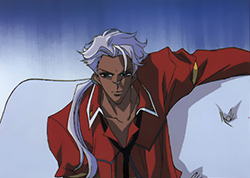 Akio Ohtori and Anthy Himemiya are first introduced in the second story arc as a charming pair of brother and sister. Yet Akio and Anthy immediately appear to dramatically contrast in both their role and stature. Where Anthy is exceptional for her passivity and submissiveness, Akio is just as uncanny for his booming voice, extraordinary knowledge and generally dominating presence. Anthy is a quiet and lonely girl with a pet mouse who aspires simply to water the roses and thus generally goes unnoticed, while Akio is the supreme Chairman of the Ohtori Academy. It is notable that the word “Chairman” indicates a majority stockholder of a modern corporation, unlike “Prince” which alludes to a hereditary “Prince du Sang” of the feudal Ancien Régime. This bourgeois title in a fantasy-gothic Academy hints at the illusory nature of the setting, while the superficial charm of Akio and Anthy masks their cosmic significance. Akio Ohtori and Anthy Himemiya are first introduced in the second story arc as a charming pair of brother and sister. Yet Akio and Anthy immediately appear to dramatically contrast in both their role and stature. Where Anthy is exceptional for her passivity and submissiveness, Akio is just as uncanny for his booming voice, extraordinary knowledge and generally dominating presence. Anthy is a quiet and lonely girl with a pet mouse who aspires simply to water the roses and thus generally goes unnoticed, while Akio is the supreme Chairman of the Ohtori Academy. It is notable that the word “Chairman” indicates a majority stockholder of a modern corporation, unlike “Prince” which alludes to a hereditary “Prince du Sang” of the feudal Ancien Régime. This bourgeois title in a fantasy-gothic Academy hints at the illusory nature of the setting, while the superficial charm of Akio and Anthy masks their cosmic significance. 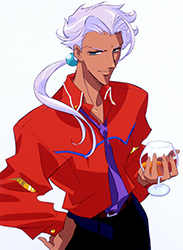
Akio Ohtori is the Chairman of the Academy and lives at the pinnacle of a tower in the center of the campus. Akio is engaged to the daughter of the former chairman of the Academy and is therefore said to soon inherit the Academy from his aging father-in-law who is never seen. The specific details of Akio's relationship are never revealed, however it seems to indicate some usurpation through marriage of an original patrimony. In the third season, Akio is revealed to be the mysterious character "End of the World" who had long been orchestrating the duels among the student council. 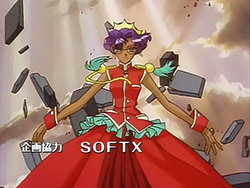 As with much of the series' symbolism, Akio's role and significance is never made entirely clear. His pseudonym "End of the World" reflects his cosmic significance as a supernatural being archetypically associated with a teleological or purposive ‘End’. This ‘End’ appears to be associated with both the mysterious "World Revolution" which is often referred to as the ultimate ambition of the Student Council, as well as the "Rose Seal" which Akio aspires to open. Akio's dominating stature, astounding foresight, and unrivalled seductive prowess buttresses a supernatural interpretation of his character. Akio is unambiguously preeminent as an aristocratic playboy among the characters. Even the monumental philanderings of the Student-Council President Touga Kiryuu appear very childish in comparison to his. It is clear that all women adore him and all men aspire to emulate him. Yet as his character is developed, it becomes increasingly apparent that this behavior is more numerous, maliciously predatory and whimsical than those of other men. The benign gentleman which is first introduced as Anthy’s brother is thus eventually revealed to be a malignant supernatural demiurge with fantastic aspirations to refashion the cosmos. As with much of the series' symbolism, Akio's role and significance is never made entirely clear. His pseudonym "End of the World" reflects his cosmic significance as a supernatural being archetypically associated with a teleological or purposive ‘End’. This ‘End’ appears to be associated with both the mysterious "World Revolution" which is often referred to as the ultimate ambition of the Student Council, as well as the "Rose Seal" which Akio aspires to open. Akio's dominating stature, astounding foresight, and unrivalled seductive prowess buttresses a supernatural interpretation of his character. Akio is unambiguously preeminent as an aristocratic playboy among the characters. Even the monumental philanderings of the Student-Council President Touga Kiryuu appear very childish in comparison to his. It is clear that all women adore him and all men aspire to emulate him. Yet as his character is developed, it becomes increasingly apparent that this behavior is more numerous, maliciously predatory and whimsical than those of other men. The benign gentleman which is first introduced as Anthy’s brother is thus eventually revealed to be a malignant supernatural demiurge with fantastic aspirations to refashion the cosmos.
Anthy Himemiya is called "the Rose Bride" and, as such, she obediently partners herself with whichever student council member happens to triumph in the dueling arena. Although Anthy, sometimes subtly and sometimes remarkably, demonstrates some design of her own she is generally portrayed as wholly submissive, instinctively compassionate and yet absent of a distinct will or selfhood. Although Anthy is remarkably passive she will occasionally, by her movements and remarks, hint at her unstated deceitfulness and discontent. Anthy’s comical pet mouse Chu-Chu often appears to achieve her purposes surreptitiously through some unstated psychic connection. And although many of the characters are suspicious of Anthy's bewildering docility, Utena remains altogether ignorant of Anthy's ploys until the conclusion of the series. Although Anthy is not lacking in intelligence or volition, she nonetheless submits to continually portray herself as though she were. In episode 34 Anthy Himemiya is revealed to suffer unspeakable agony as "the Rose Bride" through the ceaseless penetration of a harrowing multitude of steel swords. Then Anthy is presented in her ‘real’ form as a child and a witch who is perpetually enclosed within a crystalline rose tomb in which she is tormented through this evisceration. Prince Dios appears to Utena in a dream and explains that "She cannot die. She simply lives on in agony. It is her punishment for taking the prince away from the girls of the world... All she has left is her suffering." It seems that Anthy’s selfless endurance of this agony is the consequence of her voluntary humbling of her self-worth and assertiveness. She has nonetheless willingly endured these torments for all eternity due to her compassion for "Dios" and the world.
Anthy’s ‘real’ tortuous entombment in the crystalline rose prison terribly displays the psychological torment of the “Rose Bride”, whose unending self-abasement, subservience, and self-denial is illustrated through her unceasing evisceration. Anthy Himemiya’s true self, represented through her eternal childlike body, never unambiguously acts towards her own self-actualization. The crystalline tomb is thus the binding limit upon her potential to act to fulfill her own aspirations. Within this rose shaped imprisonment the evisceration by blades represents Anthy’s harrowing willful submission, both through her engagements to the duelists and through her most intimate embrace with men, to allow within her psychological and corporeal self the substantial ends of her romantic partners. The entombment of the Rose Bride represents the voluntary confinement, submission, and mutilation of her truest and most ‘real’ self, her transcendental ego, or her incorporeal psychological selfhood. When describing her suffering to Utena Tenjou in episode 37, Anthy further reveals to Utena that "In the end, girls are all like Rose Brides"; an allusion to how Anthy, while sharing in Akio’s supernatural significance, is also an archetype of Womanhood in whose characteristics and suffering all girls participate in. The rose tomb is therefore the most memorable and illuminating illustration of the Curse of the Rose Bride which Anthy Himemiya endures and through whom “all girls” participate in.
If Akio has supernatural and cosmic significance then, as Akio's twin-sister, it is reasonable to assume that Anthy shares in this significance. Akio’s potentiality to actualize his designs appears nearly unlimited while Anthy’s potential is hardly revealed and very nearly pressed into nothingness. The potentiality of Akio to dominate and control his surroundings therefore definitely contrasts with Anthy’s inverse incapacity to so much as defend herself from the abuse of her suitors. Both characters are, in their opposed characteristics, the most extreme embodiment of the opposed archetypes of Manhood and Womanhood in all of their horrific and unflattering excesses. This interpretation is buttressed by the respective sites of these characters’ principal importance: Akios’ towering phallic observatory and Anthy's Hidden Castle held aloft within the uterine dueling arena forest. I interpret this to mean that they are not merely natural human persons which represent abstract ideas. On the contrary, Akio and Anthy are supernatural manifestations, existing in a hypostatic union of the eternal Platonic Ideas and the concrete actuality of their persons. Following the idealism of Plato, Akio and Anthy actually and personally embody the eternal Forms of Manhood and Womanhood within the spatio-temporal universe and the fantastic cosmos of the Ohtori Academy. They are the living and embodied transcendent ideas of Man and Woman.
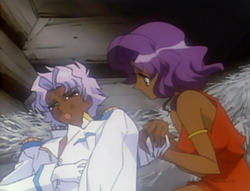 Utena Tenjou repeatedly recollects a fantastic story from her childhood in which a purple-haired prince came upon her atop a white horse in the midst of the woods, kissed her and gave her a rose signet ring, advising her to never lose her spirit of nobility. This story is later retold in episode 34 as it appears to have genuinely occurred within a gothic Christian church on the occasion of her parents’ sudden death during her childhood. In both retellings, Prince Dios miraculously appears to Utena, bestows upon her a rose signet ring and inadvertently inspires her to become a noble Prince. In episode 34, Utena is told "the Tale of the Rose", a story from the distant past in which Anthy was once a witch who had comforted Dios when he had become exhausted and ill from "helping mankind". The shadow actresses then reveal that this prior and incorrupt world had been vigilantly protected through the heroic efforts of Prince Dios. Yet somehow, through Anthy's compassion, Dios ceased assisting mankind and thereby evinced the intense resentment and antipathy of men. The cosmic significance of Dios in this past setting is as yet unclear. However, the nursing aid which Anthy provides appears to allow Dios to rest from his labors, after which he ceases to perform his princely function. Dios is repeatedly recollected by the cast yet almost never appeared on stage. He is believed to have been a supremely beautiful and benign protector of humanity, through whose selfless efforts "the girls of the world were all princesses". In both episodes 13 and 34 it is alluded to that Prince Dios continues to reside within the upturned castle which floats above the dueling arena and there remains perpetually inaccessible. The dueling arena is the principle location of the romantic contests within the series, above which the castle hovered, daunting, provoking, and inspiring all of the characters. Within this castle Dios is said to be "the light", and and equivalent to those sublime objects of consciousness which the duelists most intensely desired; "that which is eternal", "that which shines", "the power of miracles", and "the power to bring the world revolution!"
Utena Tenjou repeatedly recollects a fantastic story from her childhood in which a purple-haired prince came upon her atop a white horse in the midst of the woods, kissed her and gave her a rose signet ring, advising her to never lose her spirit of nobility. This story is later retold in episode 34 as it appears to have genuinely occurred within a gothic Christian church on the occasion of her parents’ sudden death during her childhood. In both retellings, Prince Dios miraculously appears to Utena, bestows upon her a rose signet ring and inadvertently inspires her to become a noble Prince. In episode 34, Utena is told "the Tale of the Rose", a story from the distant past in which Anthy was once a witch who had comforted Dios when he had become exhausted and ill from "helping mankind". The shadow actresses then reveal that this prior and incorrupt world had been vigilantly protected through the heroic efforts of Prince Dios. Yet somehow, through Anthy's compassion, Dios ceased assisting mankind and thereby evinced the intense resentment and antipathy of men. The cosmic significance of Dios in this past setting is as yet unclear. However, the nursing aid which Anthy provides appears to allow Dios to rest from his labors, after which he ceases to perform his princely function. Dios is repeatedly recollected by the cast yet almost never appeared on stage. He is believed to have been a supremely beautiful and benign protector of humanity, through whose selfless efforts "the girls of the world were all princesses". In both episodes 13 and 34 it is alluded to that Prince Dios continues to reside within the upturned castle which floats above the dueling arena and there remains perpetually inaccessible. The dueling arena is the principle location of the romantic contests within the series, above which the castle hovered, daunting, provoking, and inspiring all of the characters. Within this castle Dios is said to be "the light", and and equivalent to those sublime objects of consciousness which the duelists most intensely desired; "that which is eternal", "that which shines", "the power of miracles", and "the power to bring the world revolution!"
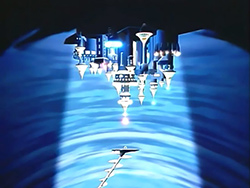 The “eternal”, the “miraculous”, and the “revolutionary” each refer to a supernatural potentiality to intervene, without a prior or sufficient cause, within the spatial and material universe. The cast of “Revolutionary Girl Utena”, as well as the entire Ohtori Academy, exist within the material universe of space and time, yet each character most intensely desires as their object a supernatural potentiality from beyond this known and intelligible cosmos. The natural universe is thought to be invariantly governed by universal natural laws of motion, causality, and sufficiency which effectively exclude any possibility of uncaused motions, regardless of whether these are miracles or revolutions. Similarly, the temporality of the universe, through which all things are left to decay, disuse, and disintegration in time, effectively imposes limitations upon the duration of bodies in space, and therefore excludes the possibility of “eternity” regardless of whether this is a supremely delightful romance or a “perfect moment”. Thus the cast of “Revolutionary Girl Utena” continually aspired, in their contested romances, to possess objects which were rationally impossible within a merely naturalistic universe. Individually and collectively they aimed to secure supernatural objects, incomprehensible to human understanding and yet for which their erotic desires would have given them no respite.
The “eternal”, the “miraculous”, and the “revolutionary” each refer to a supernatural potentiality to intervene, without a prior or sufficient cause, within the spatial and material universe. The cast of “Revolutionary Girl Utena”, as well as the entire Ohtori Academy, exist within the material universe of space and time, yet each character most intensely desires as their object a supernatural potentiality from beyond this known and intelligible cosmos. The natural universe is thought to be invariantly governed by universal natural laws of motion, causality, and sufficiency which effectively exclude any possibility of uncaused motions, regardless of whether these are miracles or revolutions. Similarly, the temporality of the universe, through which all things are left to decay, disuse, and disintegration in time, effectively imposes limitations upon the duration of bodies in space, and therefore excludes the possibility of “eternity” regardless of whether this is a supremely delightful romance or a “perfect moment”. Thus the cast of “Revolutionary Girl Utena” continually aspired, in their contested romances, to possess objects which were rationally impossible within a merely naturalistic universe. Individually and collectively they aimed to secure supernatural objects, incomprehensible to human understanding and yet for which their erotic desires would have given them no respite.
In dramatic juxtaposition to Akio, Dios is uniformly presented as an honest savior whose unmerited charity, self-sacrifice, and kindness is freely offered to Utena. Although Dios remained offstage, he appeared to repeatedly intervene in unforeseen and miraculous ways on behalf of the characters in need. Limitations which are displayed to inhibit Akio’s power are never seen to apply to Dios. The name Dios bears an unmistakable resemblance to the Latin word for God, 'Deus', and therefore inversely corresponds to Akio’s disclosure that his name was the very same as the Japanese word for the morning star 'Lucifer'. Dios appears in the guise of a youthful Akio and it is mentioned that they had been formerly united as a single being. Yet Akio is "the End of the World"; a god-figure who has seemingly replaced "Dios" just as he has usurped the patrimony of the Ohtori Academy. If Akio has replaced Dios and his cosmic significance is found in the teleological end, then it is plausible that Dios's significance was alternatively found in the beginning. If Dios is "the Beginning of the World", then he must be the progenitor and creator of the universe, whose undisclosed labors represent the act of Creation. When Anthy nurses Dios after his labors, she allegorically arouses the intense hatred of a crowd of rioters who demand that Dios rescue their daughters, and who collectively represent humanities protests and judgment. Nursing and sealing away Dios was the crime for which Anthy is ever afterwards consigned to eternal torment. If Anthy is a personification of womanhood whose torments are likewise participated in by "all girls", then Anthy's crime for which she and they are tormented must transpire at the beginning of time, concurrently with the Dios’s creation.
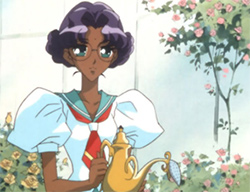 This primordial resting of Dios and nursing of Anthy represent a theodicy, or the supernatural origin of Evil. As Dios would later be replaced by the more malevolent Akio, these evils are those which are associated with the archetypes of Man and Woman as they pertain to love and romance. Dios was in the beginning a heroic demiurge, or architect of the Universe, whose misdeed was to seek comfort in the care and compassion of Anthy Himemiya. “The beginning of the world” signals both Dios’ greater creative potentiality and unspoiled innocence. Because to create a thing requires more effort than to destroy a thing, then as Dios is the creator of the cosmos his power is indisputably greater than the terminating power of Akio at its end. Anthy was in the beginning a diminutive witch whose treacherous or altruistic aid to Dios caused him to abandon his herculean task of cosmogenesis. The repose of Dios is also the cessation of his demiurgic labors in the service of all humanity in favor of the private care and intimate companionship with Woman, as Anthy. In episode 38, Akio describes how "When she [Anthy] became known as a witch Dios, the Prince, vanished from this world. The Prince I was no longer exists." The aged chairman Akio identifies his youthful self with Prince Dios who is described as though he were irreversibly gone from the cosmos. However this is not the case. Although Anthy's aid may have been altruistic, her actions are nonetheless the cause for the cessation of the divine labors of Dios. If Dios and Anthy were the primordial first Man and Woman, then their private companionship was likewise the first romance. Anthy, as Woman, is a temptress who like Eve naively brought evil into the world. Dios, as Man, is like Adam the irresponsible first Man from whose love results the origin of all evil, and mankind’s Fall from original grace. Although love may afterwards appear innocent, it is irreversibly tainted with criminality from its earliest beginning.
This primordial resting of Dios and nursing of Anthy represent a theodicy, or the supernatural origin of Evil. As Dios would later be replaced by the more malevolent Akio, these evils are those which are associated with the archetypes of Man and Woman as they pertain to love and romance. Dios was in the beginning a heroic demiurge, or architect of the Universe, whose misdeed was to seek comfort in the care and compassion of Anthy Himemiya. “The beginning of the world” signals both Dios’ greater creative potentiality and unspoiled innocence. Because to create a thing requires more effort than to destroy a thing, then as Dios is the creator of the cosmos his power is indisputably greater than the terminating power of Akio at its end. Anthy was in the beginning a diminutive witch whose treacherous or altruistic aid to Dios caused him to abandon his herculean task of cosmogenesis. The repose of Dios is also the cessation of his demiurgic labors in the service of all humanity in favor of the private care and intimate companionship with Woman, as Anthy. In episode 38, Akio describes how "When she [Anthy] became known as a witch Dios, the Prince, vanished from this world. The Prince I was no longer exists." The aged chairman Akio identifies his youthful self with Prince Dios who is described as though he were irreversibly gone from the cosmos. However this is not the case. Although Anthy's aid may have been altruistic, her actions are nonetheless the cause for the cessation of the divine labors of Dios. If Dios and Anthy were the primordial first Man and Woman, then their private companionship was likewise the first romance. Anthy, as Woman, is a temptress who like Eve naively brought evil into the world. Dios, as Man, is like Adam the irresponsible first Man from whose love results the origin of all evil, and mankind’s Fall from original grace. Although love may afterwards appear innocent, it is irreversibly tainted with criminality from its earliest beginning.
 In Plato's dialog "The Symposium", the great Athenian playwright Aristophanes tells a myth in which people long ago had two bodies, with two faces and two limbs turned away from one another. Aristophanes describes how these double-persons were in that time more powerful than today and comprised of three sexes rather than two: twin males, twin females, and a mixed pair of one male and one female body. In their pride these creatures attempted to climb to the heights of Heaven and attack the gods. As punishment, Zeus crippled them by dividing them into separate beings; some male and some female. Consequently people today expend their time ceaselessly searching to unite with their lost "other half", and therefore cannot foreseeably challenge the gods. As the first conjugal union of Man and Woman, Dios and Anthy are likewise the parents of all later men and women. When Utena confronted Akio about his incestuous relations with Anthy, he appeared wholly unconcerned and described that Utena was just as guilty as he. This reply was justified because Anthy and Akio's conjugal relations were not "unnatural" due to their unique cosmic significance as the archetypal embodiments of Man and Woman through which their incestuous relations were merely the procreative coupling, or incest, of a formerly divided humanity. As Akio and Anthy are the personal embodiments and most extreme instantiations of the transcendent and eternal Forms of Man and Woman, all later men and women genealogically participate in these polar sexed forms. Later generations are born as sexed beings who participate in these originary transcendent Forms in proportion to their relative instantiation of these sexual characteristics of Man and Woman, as they are personally embodied in Akio and Anthy. And just as Dios reposed in Anthy's care, so are all later men and women are irreversibly attracted to one another in a never-ending repetition of this “Original Sin”- the romance of Dios and Anthy Himemiya.
In Plato's dialog "The Symposium", the great Athenian playwright Aristophanes tells a myth in which people long ago had two bodies, with two faces and two limbs turned away from one another. Aristophanes describes how these double-persons were in that time more powerful than today and comprised of three sexes rather than two: twin males, twin females, and a mixed pair of one male and one female body. In their pride these creatures attempted to climb to the heights of Heaven and attack the gods. As punishment, Zeus crippled them by dividing them into separate beings; some male and some female. Consequently people today expend their time ceaselessly searching to unite with their lost "other half", and therefore cannot foreseeably challenge the gods. As the first conjugal union of Man and Woman, Dios and Anthy are likewise the parents of all later men and women. When Utena confronted Akio about his incestuous relations with Anthy, he appeared wholly unconcerned and described that Utena was just as guilty as he. This reply was justified because Anthy and Akio's conjugal relations were not "unnatural" due to their unique cosmic significance as the archetypal embodiments of Man and Woman through which their incestuous relations were merely the procreative coupling, or incest, of a formerly divided humanity. As Akio and Anthy are the personal embodiments and most extreme instantiations of the transcendent and eternal Forms of Man and Woman, all later men and women genealogically participate in these polar sexed forms. Later generations are born as sexed beings who participate in these originary transcendent Forms in proportion to their relative instantiation of these sexual characteristics of Man and Woman, as they are personally embodied in Akio and Anthy. And just as Dios reposed in Anthy's care, so are all later men and women are irreversibly attracted to one another in a never-ending repetition of this “Original Sin”- the romance of Dios and Anthy Himemiya.
In her dreams Utena is told by Dios that "He[the Prince] is now 'End of the World'". In the beginning Dios was both benevolent and interventionist. Yet with the introduction of Evil, Dios is replaced with Akio; an archetypal Man who is ever-more predatory, aloof and seemingly unconcerned with the suffering of humans. Whereas Dios had freely aided the world and through his efforts all girls were princesses, Akio claimed ownership of Anthy and manipulated the students of the Ohtori Academy for his own mysterious purposes. Rather than offering unlimited and unmerited assistance to adored and actualized princesses, Akio commanded and abused Anthy as though she were in one body and mind with him. If Dios has been transformed and replaced by Akio, how this might have occurred and what this might signify is a mystery. While Akio's powers are immense, his appearance, characteristics, and limitations distinguish him from either Prince Dios or an omnipotent and benevolent architect of the Cosmos. Furthermore, there occasionally occur miracles which greatly astonish Akio and Anthy, and indicate there to be some hidden supernatural power of which neither the Chairman nor the Rose Bride have knowledge or participation.
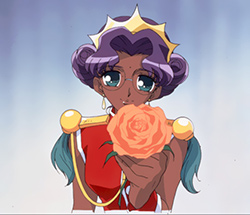 The pains of possessiveness, coitus, childbearing, birth, and nursing are felt most intensely by women, and as the personification of all women Anthy suffers eternal torment commensurate with the pains of all women. The uterine symbol of the rose appears as the crystalline prison in which Anthy, as the witch, is perpetually tormented. The Rose is the symbol of Woman’s beauty, fertility, and romance. Yet the symbolism of the Rose in “Revolutionary Girl Utena” suggests that these both exalt and imprison Woman. As the archetype of Womanhood, Anthy's sacrifice preserves the romance, reproduction, and the continuity of humanity. In episode 37, Anthy and Akio are displayed hurtling fiercely down the road. Anthy cries out in pain as Akio grimaces and accelerates. Akio distressingly tells Anthy: "In pain, Anthy? Well, I'm not the one who causes it. The world does!" The sacrifice of Anthy Himemiya as the embodiment of the Platonic Idea of Woman is one and the same as the female sex’s collective sacrifice of their lives’ potentiality through their conformity to the ideal archetype of Womanhood. Through the willful self-surrender of their minds’ ends and bodily integrity in romance and reproduction, women collectively sacrifice their potential for their self-actualization to the will and seed of their lovers; their Princes. The result of this erotic union of two egos and two bodies is the fruitful blossoming of romance and children. Yet through this sacrifice woman’s psychological and corporeal integrity is compromised, fragmented, and made dependent upon the fidelity and prosperity of her spouse and offspring. Her actualization, which had formerly been autonomously realized, is thereafter subsumed within and through the actualization of her family.
The pains of possessiveness, coitus, childbearing, birth, and nursing are felt most intensely by women, and as the personification of all women Anthy suffers eternal torment commensurate with the pains of all women. The uterine symbol of the rose appears as the crystalline prison in which Anthy, as the witch, is perpetually tormented. The Rose is the symbol of Woman’s beauty, fertility, and romance. Yet the symbolism of the Rose in “Revolutionary Girl Utena” suggests that these both exalt and imprison Woman. As the archetype of Womanhood, Anthy's sacrifice preserves the romance, reproduction, and the continuity of humanity. In episode 37, Anthy and Akio are displayed hurtling fiercely down the road. Anthy cries out in pain as Akio grimaces and accelerates. Akio distressingly tells Anthy: "In pain, Anthy? Well, I'm not the one who causes it. The world does!" The sacrifice of Anthy Himemiya as the embodiment of the Platonic Idea of Woman is one and the same as the female sex’s collective sacrifice of their lives’ potentiality through their conformity to the ideal archetype of Womanhood. Through the willful self-surrender of their minds’ ends and bodily integrity in romance and reproduction, women collectively sacrifice their potential for their self-actualization to the will and seed of their lovers; their Princes. The result of this erotic union of two egos and two bodies is the fruitful blossoming of romance and children. Yet through this sacrifice woman’s psychological and corporeal integrity is compromised, fragmented, and made dependent upon the fidelity and prosperity of her spouse and offspring. Her actualization, which had formerly been autonomously realized, is thereafter subsumed within and through the actualization of her family.
Although Anthy suffers immeasurably, she nonetheless freely assumes this burden. When Utena confronts Akio with the challenge that he had made Anthy a witch, Akio responds: "No. We both love each other. She can no longer be happy except like this". Akio attempts to explain to Utena that "A child like you cannot understand my ideals. The Rose Bride exists for ideals you do not know." Regardless of Utena’s limited perspective of these character’s actions, Akio and Anthy believe themselves to act for what they each believe to be the greatest good of humanity. Rather than acting maliciously, each character works to achieve those goods which they, in their initiated knowledge of reality understand, regardless of whether this is understood by the unitiated. And although it is not as apparent, Akio too suffers and occasionally weeps in his role as the archetypal personification of Man. Both Akio and Anthy therefore appear to share a supernatural concern for human destiny and sexual continuity, which would be inexplicable if Anthy and Akio were merely mortal humans.

 |

